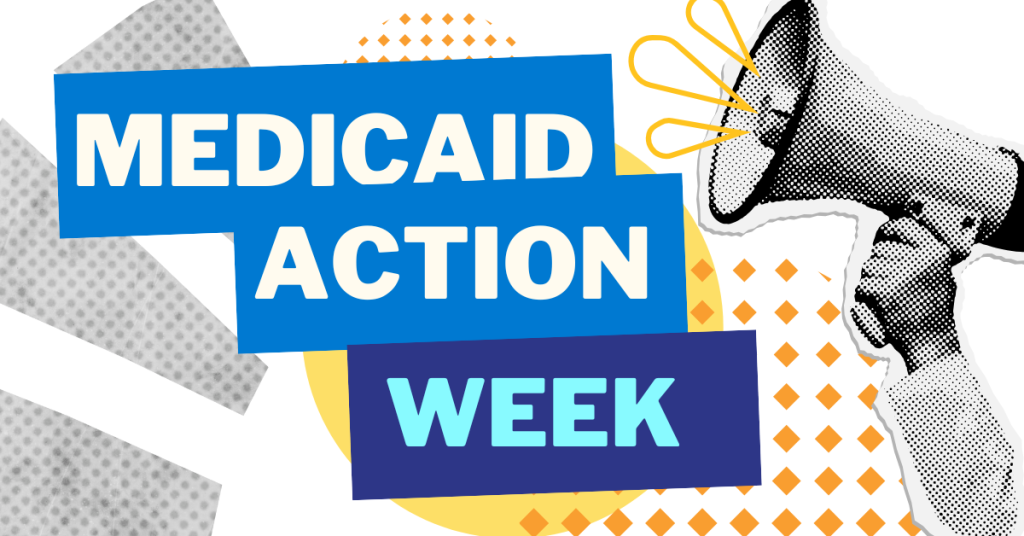Events to include a town hall, forum, and rally

FOR IMMEDIATE RELEASE
JOHNSTOWN – Some 26% of Cambria County residents receive Medicaid to pay for healthcare services. With the threat of significant federal cuts to Medicaid, local citizens are taking action to highlight what’s at stake – including a Defend Social Security and Medicaid Town Hall, a “Medicaid Matters” panel discussion, and a protest rally.
Thursday, April 17: Defend Social Security and Medicaid Town Hall: This town hall will be held at 106 Fairfield Ave. in Johnstown on April 17. Doors open at 5:30, and the event will start at 6:00. Anyone who depends on Medicaid or is concerned about the impact Medicaid cuts will have on their families and community is encouraged to attend. Attendees will have the chance to share their stories of why Social Security and Medicaid are important to them, and the stories will be recorded to be sent to Rep. John Joyce.
“Access to Medicaid enabled me to get treatment and mental health support I desperately needed to deal with an opioid use disorder,” said organizer Jason Rilogio, who is a certified peer specialist and certified recovery specialist. “Like many others, I fell into addiction after being prescribed OxyContin after an injury. Medicaid enables me and others like me to stay well, stay in recovery, and contribute to our communities.”
Monday, April 21: Medicaid Matters Forum. 6:30 pm-8:00 pm at the John P. Murtha Center at Pitt-Johnstown: The event is being planned by the newly-formed group Locals for Good (LFG) in cooperation with Pitt-Johnstown American Democracy Scholar Program and The Tribune-Democrat.
LFG is a non-partisan group of concerned citizens in the region that convened to advocate for issues that impact our area. Some of its members were active with In This Together Cambria, a volunteer group that addressed the coronavirus crisis through advocacy and education.
“LFG is designed to empower folks to take action to advocate for issues related to civil rights, social welfare, and democracy,” noted Ashlee Kiel, one of the group’s organizers. “Access to healthcare deeply impacts our community at every level, and we have urgent concerns about the impact of Medicaid cuts on individuals and families who depend on this funding to stay healthy.”
Medicaid comprises $8.2 trillion out of the $8.6 trillion in mandatory spending that the House Energy & Commerce Committee must use to come up with spending reduction. As a result, major cuts to Medicaid are the only way to meet the House’s budget resolution required $880 billion (or more) in spending reductions. Last week the Senate passed a budget blueprint laying the groundwork for cuts to healthcare and other critical programs, and on April 10 the House voted to move forward with those cuts.
This community-focused advocacy forum on April 21 will bring together experts and stakeholders to discuss the local impact of federal funding cuts to Medicaid, particularly on vulnerable populations and essential services. Featuring voices from healthcare, education, and other important viewpoints, the discussion will shed light on the often-overlooked ways Medicaid funding supports our communities and foster a deeper understanding of how the loss of this funding would affect the region.
“The goals of Pitt-Johnstown’s American Democracy Scholar program is to combine theory and civic discourse to increase understanding and inform civic action to sustain democracy,” said Chris Cook, associate professor of political science. “We feel that the mission for Locals for Good fits perfectly within this definition, which is why we are proud to co-host and sponsor this forum on why Medicaid matters. We welcome the campus and local community to hear a frank, honest and civic discourse on this important issue which impacts Johnstown.”
The panel will be moderated by Chip Minemyer, publisher of The Tribune-Democrat. Panel participants include:
- James J. Cook, FACHE, has served as the executive director of Cambria Residential Services since 1984. A fellow in the American College of Health Care Executives, Cook holds a master’s degree in public health and a master’s degree in public administration from the University of Pittsburgh. He has had leadership roles in intellectual disability and behavioral health services for 40 years, and is an honorary board member of the Rehabilitation Community Providers Association of Pennsylvania.
- Rosalie Danchanko has served as executive director of the Highlands Health Clinic, which provides medical care to uninsured and underinsured people, for 12 years. She is also the founder of Victim Services in Cambria and Somerset Counties.
- Jeannine McMillan is the executive director of the Center for Population Health, a population health resource center that works to prevent disease, reduce health disparities, and improve the overall health and well-being of Cambria and Somerset counties. She has worked in public health for the past 16 years, previously serving as manager of strategic planning for Conemaugh Health System.
- Karen Struble Myers has served as president and CEO of the United Way of the Southern Alleghenies since March 2020, where she is responsible for the planning, organization, development, and execution of the United Way’s strategic and operational tactics to meet key health and human services needs in Blair, Cambria, and Somerset Counties. She has spent more than 25 years in the nonprofit sector in a variety of leadership roles.
- Jason Rilogio is an advocate for mental health and substance use recovery. He is a regional delegate for the Cambria County Community Support Program, co-chair of the Pennsylvania Office of Mental Health and Substance Abuse Planning Council, and a voting member of the Cambria County Drug and Alcohol Program. In recovery himself, Rilogio is a certified community health worker and is organizing the town hall on April 17.
Saturday, April 26: Hands off our Healthcare Rally, 1:00-3:00 pm in Johnstown’s Central Park. LFG is organizing this rally to protest cuts to Medicaid. Anyone who is concerned about this issue is invited to come and make their voice heard.
Rep. John Joyce, who represents much of this area in the House of Representatives, was invited by both groups to attend the April 17 and 21 events, as well as Sens. John Fetterman and David McCormick. State representatives Sen. Wayne Langerholc, Rep. Frank Burns, and Rep. Jim Rigby have also been invited.
In a statement provided to WJAC earlier this year, Rep. John Joyce noted, “I have heard the concerns of many of my constituents about the Medicaid program. I remain committed to supporting Medicaid’s core mission of providing access to care for low-income children, pregnant women, and individuals with disabilities, and I will work to protect this core mission throughout the budget reconciliation process.”
Joyce’s position on Medicaid expansion is less clear, but he has an important role in Congressional action on the topic as the vice-chair of the House Committee on Energy & Commerce, which oversees the Department of Health and Human Services. He also serves on the Subcommittee on Health, which oversees public health including health insurance.
Medicaid expansion, which began nationally in 2014 and was implemented in Pennsylvania on Jan. 1, 2015, allows Medicaid to cover nearly all adults with incomes up to 138% of the Federal Poverty Level, which is $21,597 for an individual in 2025. Forty-one states, including DC, have implemented the Medicaid expansion and receive a 90 percent federal match rate (FMAP) for adults covered through the expansion, and the rest is covered by the state. The FMAP for people eligible for traditional Medicaid is determined by a formula based on per capita income – in Pennsylvania, the FMAP for this group is 56.06 percent.
77 million people are covered by Medicaid nationwide. In Pennsylvania’s 13th Congressional District, 166,191 people are currently covered by Medicaid, a number which includes 70,171 children and 24,953 seniors. Some 77 percent of Pennsylvania Medicaid spending is on seniors and people with disabilities, which in PA-13 includes 3,208 residents who rely on in-home care; 4,201 children with complex needs and disabilities on waiver services; and 4,201 Medicaid-enrolled nursing home residents.
If Medicaid expansion is cut by reducing Pennsylvania’s FMAP, the cost to Pennsylvania, coverage for 41,184 PA-13 residents would be jeopardized if the state does not find a way to cover the cost, which is estimated to be as much as $2.1 billion because the federal reimbursement rate for people covered under the expansion is so much higher than the FMAP for those covered under traditional Medicaid. The burden would then shift to the region’s hospitals, which would see millions in unreimbursable claims from the dramatic increase in uninsured people.
Medicaid supports these groups in Pennsylvania:
- Pregnant women – Medicaid helps pregnant women receive prenatal and post-partum care. It covers 39 percent of births in Pennsylvania.
- Children with special needs – Medicaid pays for early intervention therapies, in-home nursing, autism treatment services, and other services for children with disabilities.
- People seeking drug and alcohol treatment – The opioid epidemic claims 12 lives a day in Pennsylvania. Among the 700,000 Pennsylvanians who enrolled in Medicaid following expansion, over 124,000 have accessed drug and alcohol treatment. Medicaid is the state’s largest payer of substance use services.
- Adults with disabilities – 722,000 adults with disabilities receive Medicaid for their medical care.
- Low-income Medicare beneficiaries – 443,500 Medicare beneficiaries in Pennsylvania rely on Medicaid for help with Medicare cost-sharing and for services, like long-term care, that are not covered by Medicare.
- Low-wage workers – 71% of Pennsylvania Medicaid enrollees are in a family with at least one person working. Medicaid provides these families with affordable coverage and services.
Medicaid also plays a crucial role in funding school-based health services, including reimbursement for:
- School nurses, whose presence expands access to care by facilitating enrollment in Medicaid and CHIP, as well as preventative care such as screenings
- Health services provided in schools for students, especially those who qualify under the Individuals with Disabilities Education Act (IDEA).
###
Locals for Good (LFG) is a group of voters in Pennsylvania’s 13th congressional district who are building a community of action in response to unprecedented threats to American democracy. Founded, funded, and run entirely by local citizens, LFG is unaffiliated with any national organization or political party, and its advocacy efforts are nonpartisan, community-led, and hyper local. LFG’s goal is to organize constituents with shared concerns across PA-13 and empower them to advocate for these issues through civic education, advocacy training, and strategic action. For more information, visit www.lfgpa.org.
